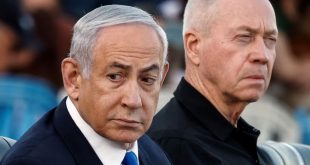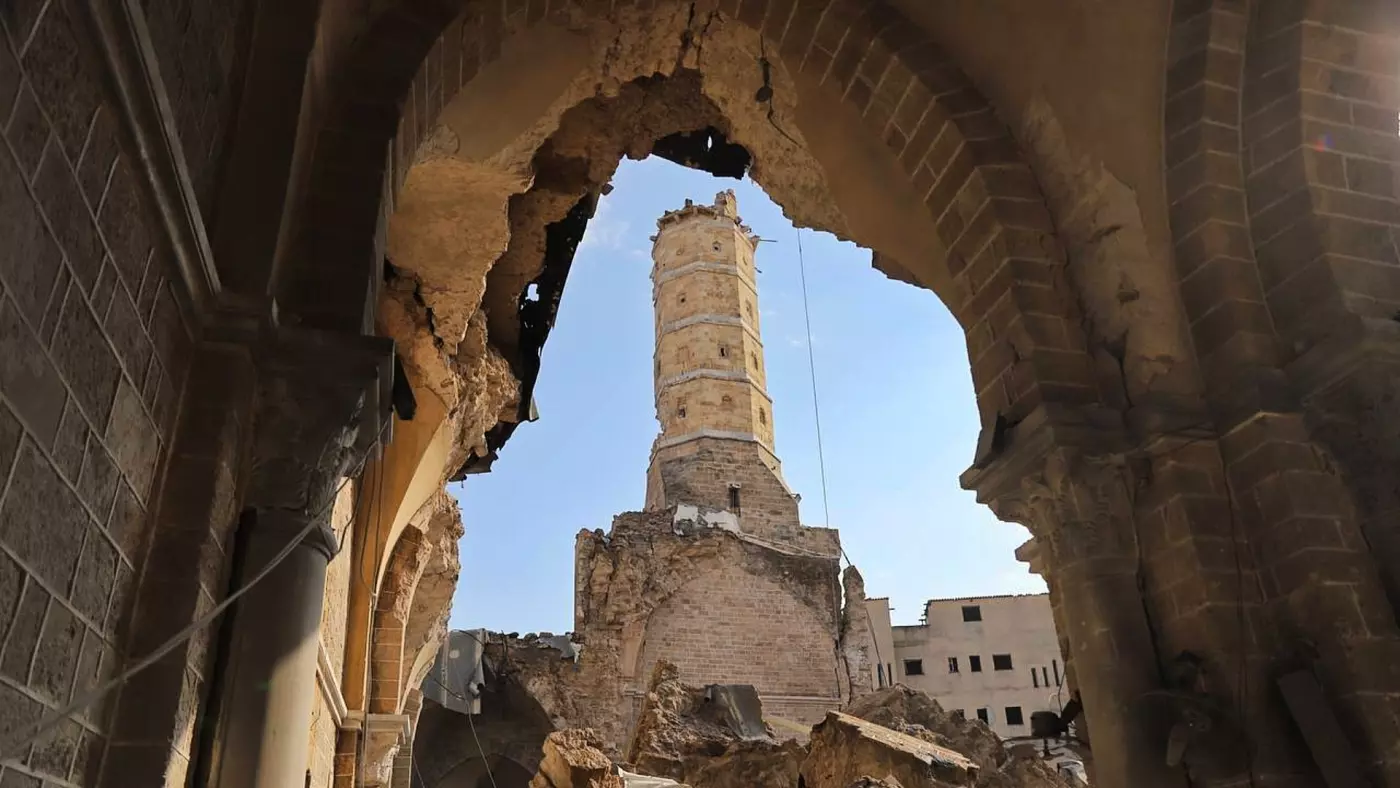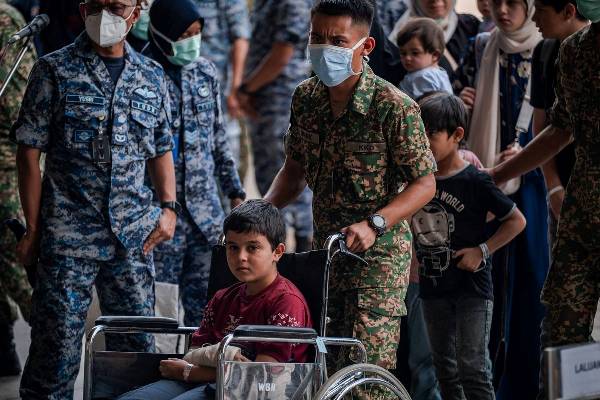The ongoing Israel-Palestine war has raised serious questions about the future of the Middle East and how it interacts with global powers.
With the US and a number of western states throwing their unconditional support behind Israel, some Arab countries have found themselves trying to safeguard their interests while appeasing public anger.
On Saturday, Saudi Foreign Minister Faisal Bin Farhan announced that a delegation from the Joint Arab-Islamic Extraordinary Summit, which took place in Riyadh earlier this month, will be going to several world capitals to promote an immediate ceasefire in Gaza.
The first destination of that trip was China, followed by Russia, raising questions on the possibility of a shift amongst Arab states towards the East.
Several powerful Arab states have been playing careful diplomatic games ever since the eruption of the latest war.
The latter began when a Hamas-led assault on southern Israel killed more than 1,100 Israelis on 7 October. Israel’s relentless retaliatory bombing of Gaza, along with its ground incursion, has killed over 14,500 Palestinians and destroyed much of the enclave’s civilian infrastructure.
‘Palestinians know the Arab people deeply support their cause, but they feel abandoned by leaders who talk the talk, but never walk the walk’
– Tariq Kenney-Shawa, al-Shabaka
While all Arab countries have released statements condemning Israel’s war in Gaza, countries that have signed recent peace treaties with Israel seem largely concerned with securing their new relations with the state.
Starting in 2020, the US-brokered Abraham Accords saw Israel establish diplomatic ties with the United Arab Emirates, Bahrain, Sudan, and Morocco. Prior to 7 October, Saudi Arabia was seen as the next, and arguably most significant state to normalise relations.
“Saudi Arabia has taken a relatively strong stance, by suspending its normalisation talks with Israel,” Elham Fakhro, associate fellow at Chatham House’s Middle East and North Africa programme, told Middle East Eye.
“But the Arab states that already have relations with Israel have mostly refused to jeopardise these relations.”
On 2 November, Bahrain’s parliament said in a statement that Manama had recalled its ambassador to Israel, with other media reports refuting the claim, and without any comment from the country’s foreign ministry.
Follow Middle East Eye’s live coverage of the Israel-Palestine war
No similar moves have been seen from other Abraham Accords signatories. Tariq Kenney-Shawa, US policy fellow at Palestinian policy network Al-Shabaka, says this relative inaction is not too surprising to Palestinians.
“Most Palestinians are profoundly disappointed by the response, or lack thereof, of Arab leaders across the region,” he told MEE. “Ultimately, Palestinians know the Arab people, the Arab streets, deeply support their cause, but they feel abandoned by leaders who talk the talk, but never walk the walk.”
‘A far cry from historic unity’
Relative pressure was seen coming from Egypt and Jordan, known as the old normalisation regimes, as they signed peace treaties with Israel decades before the Abraham Accords.
Egypt’s President Abdel Fattah el-Sisi made it clear that he strongly opposes any plans to displace Gaza’s population to Egypt’s Sinai.
However Cairo faces criticism over its reluctance to open the Rafah crossing with Gaza more actively.
Jordan, on the other hand, expelled the Israeli ambassador in Amman, and recalled its own. It also pulled out of an energy-for-water deal with Israel amid domestic pressure.
Both these states have actively pursued and arrested citizens protesting in solidarity with Gaza, while trying to appease public anger through more robust stances against Israel.
“Arab leaders like Sisi, King Abdullah, and Mohammad Bin Salman do have leverage they can use to pressure Israel, such as threatening to withdraw from normalisation agreements or negotiations,” said Kenney-Shawa.
He adds that these states still prefer to safeguard the support they receive from western nations, along with the security and economic agreements they benefit from.
Fakhro agrees, saying Arab states remain divided over their preferred course of action.
“It is definitely a far cry from historic unity on the matter, during the oil embargo of 1973 for example,” she said.
During the 1973 Arab-Israeli war, in response to western states’ support for Israel, the Organization of Petroleum Exporting Countries (OPEC), led by then-Saudi King Faisal, implemented an oil embargo on several western countries including the US, the Netherlands, Rhodesia, amongst others.
The price of a single oil barrel quadrupled during the embargo, and the US saw nationwide fuel shortages.
Now, as Israel’s war in Gaza continues with just a temporary Qatar-brokered truce, unified Arab stances have stuck to demanding a ceasefire, with Saudi Arabia calling on states to stop exporting weapons to Israel.
However, experts believe continued American support for its ally may eventually have an impact on even its closest Arab leaders.
According to Kenney-Shawa, this has the potential to slightly widen the global East-West divide.
“The Arab people and their leaders are witnessing how eagerly the US supports the wholesale murder of fellow Arabs and this will push them towards deepening relationships with other powers such as China,” he said.
‘The Arab people and their leaders are witnessing how eagerly the US supports the wholesale murder of fellow Arabs and this will push them towards deepening relationships with… China’
– Tariq Kenney-Shawa, al-Shabaka
While China is by no means expected to replace the US in the region, its relatively constructive approach to Middle Eastern conflicts, bolstered by its mediation of Saudi-Iranian reconciliation, could see it play a more relevant role.
Fakhro believes “the Gulf States do see countries like Russia and China as useful partners.
“Their turn East is part of a broader effort to diversify their relationships beyond the United States, at a time when Washington has been clear about its intent to draw down from the region,” she added.
Having US rivals as alternative partners could also allow Gulf states to have more leverage in Washington, should the latter move in an undesired direction.
These positions remain, however, out of self-interest rather than genuine support for the Palestinian cause.
Kenney-Shawa argues that this is the main factor determining official Arab attitudes towards Israel and Palestine.
“As long as the Arab world is run by self-interested autocrats bent on preserving their own power at whatever the cost, Palestinians should not expect them to mount serious pressure against Israel,” he said.
Post Disclaimer | Support Us
Support Us
The sailanmuslim.com web site entirely supported by individual donors and well wishers. If you regularly visit this site and wish to show your appreciation, or if you wish to see further development of sailanmuslim.com, please donate us
IMPORTANT : All content hosted on sailanmuslim.com is solely for non-commercial purposes and with the permission of original copyright holders. Any other use of the hosted content, such as for financial gain, requires express approval from the copyright owners.
 Sri lanka Muslims Web Portal Sri Lanka Muslims News Center
Sri lanka Muslims Web Portal Sri Lanka Muslims News Center

 Donate
Donate


